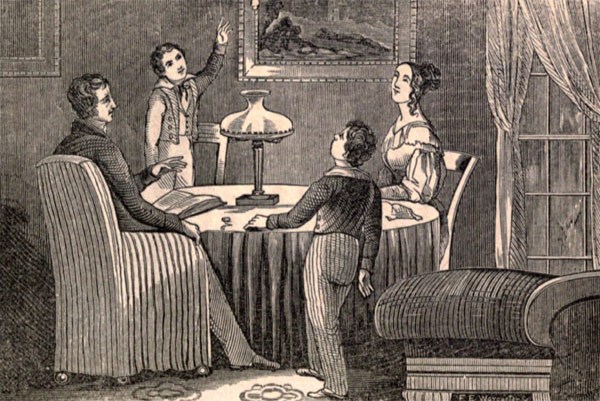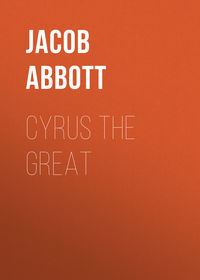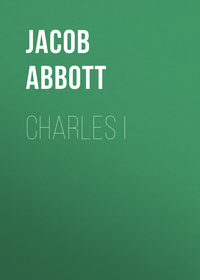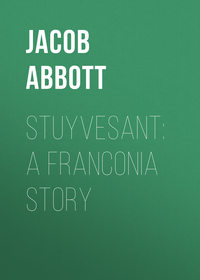![Rollo's Philosophy. [Air]](/covers_330/36364270.jpg)
Rollo's Philosophy. [Air]
Rollo went all around the barn, trying to find some place where he could get out; but he could not find any place at all.
"Let us go up stairs," said he, at length, to Nathan.
"O, it will not do any good to go up stairs," said Nathan. "It would kill us to jump out the window."
"I know we can't jump out the window," said Rollo, "but perhaps we can find out some way to get down. O, there is a ladder; I remember now, Nathan, there is a ladder. We can get down from the window by the ladder."
"I shall be afraid to go down the ladder," said Nathan.
"O no," said Rollo, "I will go first, and see if it is safe."
By this time they had reached the barn chamber. There was a window in it, with glass, over the great barn door; but Rollo could not get it open. He told Nathan that, if he could only get it open, and could find a long pole, he could reach it down, and knock the fid out, and so open the great doors. But, with all his efforts, he could not raise the window.
There was another window, which had no glass, but was closed by a wooden shutter, which opened upon hinges like a door. Rollo said he meant to open this window. Now, it happened that this window was upon that side of the barn which was exposed to the wind and storm; and, the moment that Rollo had pushed open the shutter a little way, the wind forced it instantly from his hand, and slammed it back against the side of the barn, with great violence. It almost pulled Rollo himself out of the window.
Nathan looked frightened. Rollo himself looked somewhat astonished at such an unexpected effect; but presently said,—
"Well, Nathan, I rather think that, if you had had hold of that shutter, you would have thought that air was a real thing."
"O, that was the wind, Rollo; that was the wind," said Nathan.
Rollo did not answer, but went to the ladder, which was standing up against the hay-loft. It was a pretty long, but yet a very light ladder; and Rollo and Nathan succeeded, after some difficulty, in getting it down, and in running the end out of the window. When the lower end reached the ground, the upper end was two or three feet above the bottom of the window; so that Rollo could easily get upon it to descend. The wind and storm, which raged with great violence, were somewhat terrifying; but he knew that the ladder was secure, the upper part being confined in the window; and so he resolutely descended. When he had fairly reached the ground, he looked up, with an expression of great satisfaction upon his countenance, and said,—
"There! now, Nathan, for your turn."
But Nathan was afraid to venture; and Rollo himself was half afraid to have him make the attempt. While they were standing in this perplexity, Rollo heard a voice behind him, calling out,—
"Rollo."
Rollo turned, and saw Dorothy standing by the door.
"What are you doing, Rollo?" said Dorothy.
"I am trying to get Nathan out of the barn," said Rollo.
"How came he in the barn?" said Dorothy.
"Why, Jonas locked us in, and I had to come down the ladder; but Nathan is afraid, and I can't get him out."
"Why don't you go to the door, and let him right out?"
"O," said Rollo, laughing, "I never thought of that. Go down, Nathan," he continued, "to the door, and I will go round and knock out the fid."
So Nathan went down, and Rollo, meeting him there, knocked out the fid, and released him from his imprisonment.
QUESTIONS
What was the first experiment with the bellows, described in this chapter? Why could not Nathan press the two sides of the bellows together, while the nose was stopped? What was the second experiment? What was the effect produced by turning the bellows bottom upwards, as in the third experiment? What was the fourth experiment? What was the use of the smoke of the paper? How were the experiments interrupted? What evidence did Rollo and Nathan have that the air was a real substance, when in the barn chamber?
CHAPTER V.
PRESSURE
One evening, just after tea, Rollo came to his father, who was sitting by the side of the fire, and said,—
"Father, I wish we could see the air, as we can the water, and then perhaps we could try experiments with it."
"O, we can try experiments with the air as it is," said his father.
"Can we?" said Rollo; "I don't see how."
"We cannot see the air, it is true; but then we can see its effects, and so we can experiment upon it."
"Well, at any rate," said Rollo, "we can't build a dam, and make it spout through a hole, like water."
"No," said his father, "not exactly. In your dam, for instance, when it was full, you had water on one side of the board, and no water on the other; and then, by opening a hole in the board, the water spouted through; but we cannot very well get air on one side of a partition, and no air on the other; if we could, it would spout through very much as the water did."
"Why can't we do that, sir?" said Rollo.
"Because," replied his father, "we are all surrounded and enveloped with air. It spreads in every direction all around us, and rises many miles above us. Whereas, in respect to water, you had one little stream before you, which you could manage just as you pleased. If you were down at the bottom of the sea, then the water would be all around you and above you; and there, even if you could live there, you could not have a dam."
"No, sir," said Rollo, "the water would be everywhere."
"Yes," replied his father, "and the air is everywhere. If, however, we could get it away from any place, as, for instance, from this room, then bore a hole through the wall, the weight of the air outside would crowd a portion of it through the hole, exactly as the weight of the water above the board in your dam crowded a part through the hole in the board."
"I wish we could try it," said Rollo.
"We can try it, in substance," said his father, "in this room; or—no, the china closet will be better."
There was a china closet, which had two doors in it. One door opened into the parlor, where Rollo and his father were sitting. The other door opened into the back part of the entry. Rollo's father explained how he was going to perform the experiment, thus:—
"If we could, by any means, get all the air out of the closet for a moment, then the pressure of the air outside would force a jet of it in through the key-holes of the doors, and the crevices."
"And how can we get the air out?" said Rollo.
"We can't," said his father, "get it all out; but we can get a part of it out by shutting the door quick. The door will carry with it a part of the air that was in the closet, and then the outside air will be spouted in, through the key-hole of the other door. Only we can't see it, as we can the water."
"No," said Rollo; "but I can put my hand there, and feel it."
"A better way," said his father, "would be to hold a lamp opposite to the key-hole, and see if it blows the flame."
Rollo tried the experiment, in the way his father had described. He went into the closet with the lamp. He held the lamp opposite to the key-hole, and pretty near to it, and then he asked Nathan to shut the other door suddenly. Nathan, who was standing all ready by the other door, which was about half open, put his two hands against it, and pushed it to, with all his strength, producing a great concussion.
"O Nathan," said his father, "you need not be quite so violent as that."
"It succeeded, father, it succeeded," said Rollo.
"I'm glad it succeeded," said his father; "but Nathan need not have shut the door with so much force."
"I wanted to drive out all the air," said Nathan.
"I'll show you how to do it," said his father.
Rollo's father accordingly arose, and came to the closet door. He opened the door wide, and then explained to the boys, that the beginning of the movement of the door, when it was wide open, did not drive out any air.
"For," said he, "there is so large a space between the edge of the door and the wall, that the air that is put in motion by the movement of the door, can pass directly round the edge, back into the closet again. It is only when the door is almost shut, when the edge of it comes close to the casing all around, that the movement of the door drives the air out."
Then he took hold of the latch of the door, and put it almost to, very gently. He turned the latch so as to prevent its snapping against the catch, and then pushed it suddenly into its place three or four times, opening the door only a very little way every time.
"Now," said he, "hold the lamp at the key-hole, and watch the flame, while I shut the door two or three times in this way."
Rollo did so, Nathan standing all the time by his side. They observed that the flame of the lamp was driven into the room every time the door was shut; proving that, every time a little of the air was driven out by the door, a little puff rushed in at the key-hole.
"Let us stop up the key-hole," said Rollo, "and then it can't get in."
"Yes," said his father, "there are a great many little crevices all around the closet, where the air can come in."
"Couldn't we stop those up too?" said Rollo.
"No," said his father, "not so as to make the closet air-tight. For, if the crevices could all be stopped exactly, the air would come in through the very wood itself."
"How?" said Rollo.
"Why, there are little pores in wood, that is, little channels that the sap flowed in when the wood was growing, and the air can pass through these."
Here Rollo's father observed that Rollo was looking very intently at the table; and he asked him what he was doing: he said he was trying to find some of the pores.
"You can't see them there," said his father. "St. Domingo mahogany is a very hard and close-grained kind of wood. If it was summer, and you could dig down and get a small piece of the root of the great elm-tree in the yard, you could see the pores and channels there."
After some more conversation on this subject, Rollo asked his father if he could not think of some other experiments for them to try. His father said that he did not just then think of any experiment, but that, if Rollo and Nathan would come and sit down by the fire, he would give them some information on the subject. Rollo's mother said that she should like to hear too. They accordingly waited until she was ready, and then, when all were seated, Mr. Holiday began thus:—
"Air is in many respects much like water."
"Yes," interrupted Rollo, "just like water, only thinner, because, you see–"
"You must not interrupt me," said his father, "unless to ask some question, which is necessary to understand what I say. It is entirely irregular for a pupil, instead of listening to his teacher, to interrupt, in order to tell something that he knows himself."
Rollo's father smiled, as he said this, but Rollo looked rather ashamed. Then his father proceeded: —
"There is one very remarkable difference between them. Water is not compressible by force; but air is."
"What is the meaning of compressible?" said Nathan.
"Compressible things," said his father, "are those that can be compressed, that is, pressed together, so as to take up less room than they did before. Sponge is compressible. A pillow is compressible. But iron is not compressible, and water is not compressible."
"I should think it was," said Nathan; "it is very soft."
"It is very yielding," replied his father, "when you press it, but it is not pressed into any smaller space. It only moves away. If you have a tumbler half full of water, and press a ball down into it, you could not crowd the water into any smaller space than it occupied at first; but, as fast as the ball went down, the water would come up around the sides of the ball."
"But suppose," said Rollo, "that the ball was just big enough to fit the tumbler all around; then the water could not come up."
"And then," said his father, "you could not crowd the ball down."
"Could not a very strong man?" said Nathan.
"No," replied his father, "the water cannot be sensibly compressed. But now, if the tumbler contained only air, and if a ball were to be put in at the top, just large enough to fit the tumbler exactly, and if a strong man were to crowd it down with all his strength, he would, perhaps, compress the air into half the space which it occupied before."
"Perhaps the tumbler would break," said Nathan.
"Yes," replied his father, "and the tumbler will answer only for a supposition; but for a real experiment it would be best to have a cylinder of iron."
"What is a cylinder?" said Nathan.
"An iron vessel, shaped like a tumbler, only as large at the bottom as it is at the top, would be a cylinder. Now, if there was a cylinder of iron, with the inside turned perfectly true, and a brass piston fitted to it–"
"What is a piston?" said Nathan.
"A piston," said his father, "is a sort of stopper, exactly fitted to the inside of a cylinder, so as to slide up and down. It is made to fit perfectly, and then it is oiled, so as to go up and down without much friction, that is, hard rubbing. There is a sort of stem coming up from the middle of the piston, called the piston rod, which is to draw up the piston, and to press it down by.
"Now," continued his father, "if a strong man had a cylinder like this, with a piston fitted to it, and a strong handle across the top of the piston rod, perhaps he might press the air into one half the space which it occupied before. That is, if the cylinder was full of air when he put the piston in, perhaps he could get the piston down half way to the bottom. Then the air would be twice as dense as it was before; that is, there would be twice as much of it in the same space as there was before. It would be twice as compact and heavy. This is called condensing air. The philosophers have ingenious instruments for condensing air.
"If, however, a man condenses air in this way, by crowding down a piston, he does not begin the condensation when the piston begins to descend. The air is condensed a great deal before he begins. All the air around us is condensed."
"How comes it condensed?" said Rollo.
"Why, you recollect that, when you bored a hole through the board in the bottom of your dam, the water spouted out."
"No, father," said Rollo, "we pulled the plug out; Jonas bored the hole."
"Well," said his father, "the water spouted out."
"Yes," said Rollo.
"What made it?" said his father.
"Why, the water above it was heavy, and pressed down upon it, and crowded it out through the hole."
"Yes," said his father, "and the deeper the water, the more heavily it was pressed."
"Yes, sir," said Rollo, "and the farther it spouted."
"Because it was pressed down by the load of such a high column of water."
"Yes, sir," said Rollo.
"Well," replied his father, "it is just so with the air. The air all around us is pressed down by the load of all that is above us. We are, in fact, down at the bottom of a great ocean of air, and the air here is loaded down very heavy."
"How heavy?" said Rollo.
"O, very heavy indeed," said his father.
"Why, air is pretty light," said Rollo.
"Yes," replied his father, "but then the column of it is very high."
"How high?" said Rollo.
"Why, between thirty and forty miles. But it grows thinner and thinner towards the top; so it is not as heavy, by any means, as a column of air would be, thirty miles high, and as dense all the way up as it is here."
"What makes it grow thinner and thinner towards the top?" said Rollo.
"Because," said his father, "that which is near the top, has not as much load of air above it, to press it down."
"And that which is at the top," said Rollo, "has none above it, to press it down."
"No," replied his father.
"And how thin is it there?"
"Nobody knows," said his father.
"What, nobody at all?" said Nathan.
"No, I believe not; at least I do not; and I don't know that any body does."
"How do they know, then, how high it is?" said Rollo.
"The philosophers have calculated in some way or other, though I don't exactly know how. I believe they have ascertained how great the pressure of the air is here at the surface of the earth, and have calculated in some way, from that, how high the air must be to produce such a pressure."
"And how high must it be?" said Nathan.
"Why, between thirty and forty miles," said Rollo; "father told us once."
"And yet," continued his father, "water, thirty or forty feet deep, would produce as great a pressure as a column of air of thirty or forty miles. That is, the air around presses about as heavily, and would force a jet of air through a hole with about as much force, as water would, coming out at the bottom of a dam, as high as a common three-story house."
These explanations were all very interesting to Rollo and to his mother; but Nathan found it rather hard to understand them all, and he began to be somewhat restless and uneasy. At length he said,—
"And now, father, haven't you almost done telling about the air?"
"Why, yes," said his father; "I have told you enough for this time; only you must remember it all."
"I don't think I can remember it quite all," said Nathan.
"Well, then, remember the general principle, at any rate," said his father, "which is this—that we live at the bottom of a vast ocean of air, and that the lower portions of this air are pressed down by the load of all the air above; that, being so pressed, the lower air is condensed,—so that we live in the midst of air that is pressed down, and condensed, by the load of all that is above it; and that, consequently, whenever the air is taken away, even in part, from any place, as you removed some of it from the china closet, the pressure upon the air outside forces the air in through every opening it can find."
"I think that is a little too much for me to remember," said Nathan.
Nathan's father and mother laughed on hearing this, though Nathan did not know what they were laughing at. His father told him that he could not expect him to remember all; and that, to pay him for his particular attention, he would tell him a story.
So he took Nathan up in his lap, and told him a very curious story of a boy, who went about the yard with a little dog upon one of his shoulders, a cat upon the other, and a squirrel on his head. The squirrel was tame.
QUESTIONS
Why cannot experiments be performed upon the pressure of air, as conveniently as upon the pressure of water? How did Rollo's father contrive to remove a part of the air from the china closet? Where did they expect that the air would be forced into the closet? How were they to make this effect visible? Did the experiment succeed? Suppose the key-hole had been stopped up; where would the air have been forced in? Suppose all the crevices had been closed. Is water compressible? Is air compressible? What is the shape of a cylinder? What is a piston? How might air be compressed by means of a cylinder and piston? What was the general principle which Rollo's father stated, in conclusion?
CHAPTER VI.
BALLOONING
The next evening, Rollo and Nathan had another conversation with their father, respecting air. When they were all seated, he commenced as follows:—
"I told you yesterday, that air may be compressed by force, while water cannot be. It has another property, which is in some respects the reverse of this. It springs back into its original bulk, when the pressure is removed."
"How?" said Nathan; "I don't exactly understand you."
"Why, you remember what I said about the experiment with the iron cylinder and a piston to fit it."
"Yes, sir," said Rollo.
"What was the experiment?" said his father.
"Why, if a man were to press the piston down hard, he could crowd the air all into the lower half of the cylinder."
"Yes," replied his father. "Now, the property I am going to tell you about this evening is this—that, if the man lets go of the piston rod, the air that is condensed into the bottom of the cylinder, will spring up, and force the piston up again. This property is called elasticity. It is sometimes called the expansive force of the air. For it is a force tending to expand the air, that is, to swell it out into its original dimensions. This is another great difference between air and water.
"Now, as all the air around us," continued Rollo's father, "is pressed down very heavily, and is condensed a great deal, it is all the time endeavoring to expand; and it would expand, were it not that the great burden of the air above it keeps it condensed. But water is not compressed, and has no tendency to expand. The water of Rollo's dam, for instance, had all the weight of the atmosphere resting upon it, but it did not compress it at all, and so it did not tend to expand.
"And now," said his father, "I cannot perform any experiment, to show you that air tends strongly to expand or swell out into a great space, while water does not; but I can make a supposition, which will illustrate it. Suppose we had a large, but very thin, glass bottle, filled with water, and put down upon the floor in the middle of this room. Suppose, also, that we had another bottle, of the same size and shape, filled with air, and we put that down upon the floor by the side of the other; both bottles being stopped very tight. Now, if we could by any means suddenly take away all the air from the room, so that there should be nothing around the bottles, then the bottle of water would remain just as it is, for the glass would have nothing to support but the weight of the water, and it would be strong enough for that. But the bottle of air would fly all to pieces; for that would not rest quietly, like the water, satisfied with the space which it already has, and only pressing with its own weight upon the sides of the glass; but it would immediately expand with so much force as to break the thin glass all to pieces."
"Would it!" exclaimed Rollo and Nathan together. "And would it make a loud noise?"
"Yes," replied their father, "I presume it would make a loud explosion; that is, if the air in the room around it could by any means be all at once and suddenly removed.
"And so you must remember," he continued, "that there are two very remarkable differences between air and water. Air may be condensed by pressure, and, as it exists all around us, is greatly condensed by the pressure of the air above, and it may be compressed more. And air is expansive, while water is not. Whenever the pressure upon it is removed, it suddenly expands, or spreads out in all directions."
"O dear me!" said Nathan, with a sigh.
"What is the matter?" said his father.
"Why, I can't understand it very well."
"Can't you?" said his father. "Well, I must admit that you are rather too young to study pneumatics."
"Pneumatics?" repeated Rollo.
"Yes," said his father; "that is the name of this science."

"Then it sailed slowly away."—Page 85.
"What, the science of air?" said Rollo.
"Yes," said his father, "the science which treats of air, and of all other compressible and expansive fluids. But let me think. I must try to tell you something which Nathan can understand and be interested in. If I had a very light feather, I could let him perform an experiment."
"Would a little down do?" said Rollo's mother.
"Yes," replied his father, "that would be better than a feather."
Mrs. Holiday then went and brought a little down, and handed it to Rollo's father. Now, there was a lamp upon the table, of a peculiar kind, called a study lamp. It had a glass tube, called a chimney, around the wick, and consequently around the flame itself, being round, like a ring.
Rollo's father told Nathan to hold the down over the top of this glass chimney, and then to let it go.
Nathan did so. The little tuft of down was wafted up into the air, quite high above the lamp, and then it sailed slowly away, and fell down upon the table.
"I know what makes it rise," said Rollo. "It is the heat. The heat makes it rise."









